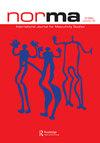标记男性、情感和护理工作:Jhumpa Lahiri的《低地》中孟加拉中产阶级男子气概的研究
IF 1.5
Q2 SOCIOLOGY
引用次数: 0
摘要
摘要本文探讨了普利策奖得主印度裔美国作家Jhumpa Lahiri在《低地》(2013)中对男性气质和关爱工作的投入。小说发生在一个孟加拉中产阶级家庭,围绕着三个主要人物的个人主义愿望和智力动机展开——苏巴什、乌达扬两兄弟和他们最终结婚的女人高里。本文首先关注孟加拉中产阶级知识分子男子气概的文化档案,然后通过对苏巴什感受男子气概的具体关注,来刻画拉希里对孟加拉中产阶级男子气概的题词。情感理论被认为是一种必要的启发式方法,可以定位这一理论检验,并进一步揭示Subhash关于生殖非规范性的复杂性。在这样做的过程中,本文还考虑了孟加拉异规范家庭中护理工作的性别性质,同时将Subhash的男性气质作为一个恰当的例子,在这个例子中,自然主义的性别思想被成功地模糊了。本文对苏巴什男性气质的关注,并不能代表孟加拉中产阶级的各种男性气质,主要是通过情感理论的视角,从理论上标记异质中产阶级男性气质的路线图。本文章由计算机程序翻译,如有差异,请以英文原文为准。
Marking men, affect and care work: a study of middle-class Bengali masculinity in Jhumpa Lahiri's The Lowland
ABSTRACT
This article examines Pulitizer prize-winning Indian American writer Jhumpa Lahiri's engagement with masculinity and care-work in The Lowland (2013). Situated in a middle-class Bengali family, the novel revolves around the individualistic aspirations and intellectual motivations of the three main characters – the two brothers Subhash, Udayan and the woman they eventually marry, Gauri. This article first draws attention to the cultural archive of middle-class intellectual Bengali masculinity and then proceeds to delineate Lahiri's inscription of Bengali middle-class masculinity through her specific focus on Subhash's feeling masculinity. Affect theory is considered a necessary heuristic to situate this theoretical examination and further unpack Subhash's complication of reproductive heteronormativity. In doing so, this article also considers the gendered nature of care-work within the Bengali heteronormative family while at the same time positing Subhash's masculinity as a case in point, where naturalised gendered ideas are successfully blurred. By no means representative of all kinds of middle-class Bengali masculinities, this article's focus on Subhash's masculinity mainly situates a road map to theoretically mark heteronormative middle-class masculinity through the lens of affect theory.
求助全文
通过发布文献求助,成功后即可免费获取论文全文。
去求助
来源期刊

NORMA
Social Sciences-Gender Studies
CiteScore
3.00
自引率
14.30%
发文量
23
期刊介绍:
NORMA is an international journal for high quality research concerning masculinity in its many forms. This is an interdisciplinary journal concerning questions about the body, about social and textual practices, and about men and masculinities in social structures. We aim to advance theory and methods in this field. We hope to present new themes for critical studies of men and masculinities, and develop new approaches to ''intersections'' with race, sexuality, class and coloniality. We are eager to have conversations about the role of men and boys, and the place of masculinities, in achieving gender equality and social equality. The journal was begun in the Nordic region; we now strongly invite scholarly work from all parts of the world, as well as research about transnational relations and spaces. All submitted manuscripts are subject to initial appraisal by the Editors, and, if found suitable for further consideration, to peer review by independent, anonymous expert referees. All peer review is double blind and submission is online via Editorial Manager.
 求助内容:
求助内容: 应助结果提醒方式:
应助结果提醒方式:


